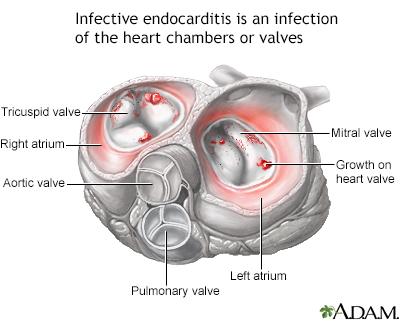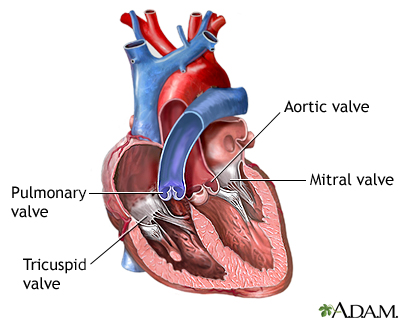Endocarditis
Valve infection; Staphylococcus aureus - endocarditis; Enterococcus - endocarditis; Streptococcus viridans - endocarditis; Candida - endocarditis
Endocarditis is inflammation of the inside lining of the heart chambers and heart valves (endocardium). It is most often caused by a bacterial or, rarely, a fungal infection.
Images






Presentation

I Would Like to Learn About:
Causes
Endocarditis can involve the heart muscle, heart valves, or lining of the heart. Some people who develop endocarditis have a:
- Birth defect of the heart
- Damaged or abnormal heart valve
- History of endocarditis
- New heart valve after surgery
- Parenteral (intravenous) drug use disorder or addiction
- Long-term intravenous line in place
Endocarditis begins when germs enter the bloodstream and then travel to the heart.
- Bacterial infection is the most common cause of endocarditis.
- Endocarditis can also be caused by fungi, such as Candida.
- In some cases, no cause can be found.
Germs are most likely to enter the bloodstream during:
- Central venous access lines
- Injection drug use, from the use of unclean (unsterile) needles
- Recent dental surgery
- Other surgeries or minor procedures to the breathing tract, urinary tract, infected skin, or bones and muscles
Symptoms
Symptoms of endocarditis may develop slowly or suddenly.
Fever, chills, and sweating are frequent symptoms. These sometimes can:
- Be present for days before any other symptoms appear
- Come and go, or be more noticeable at nighttime
You may also have fatigue, weakness, weight loss, loss of appetite, and aches and pains in the muscles or joints.
Other signs can include:
- Small areas of bleeding under the nails (splinter hemorrhages)
- Red, painless skin spots on the palms and soles (Janeway lesions)
- Red, painful nodes in the pads of the fingers and toes (Osler nodes)
- Shortness of breath with activity
- Swelling of feet, legs, abdomen
Exams and Tests
The health care provider may detect a new heart murmur, or a change in an existing heart murmur.
An eye exam may show bleeding in the retina and a central area of clearing. This finding is known as Roth spots. There may be small, pinpoint areas of bleeding on the surface of the eye or the eyelids called petechiae.
Tests that may be done include:
- Blood culture to identify the bacteria or fungus that is causing the infection
- Complete blood count (CBC), C-reactive protein (CRP), or erythrocyte sedimentation rate (ESR)
- An echocardiogram to look at the heart valves
Treatment
You may need to be in the hospital to get antibiotics through a vein (IV or intravenously). Blood cultures and tests will help your provider choose the best antibiotic.
You will then need long-term antibiotic therapy.
- People most often need therapy for 4 to 6 weeks to kill all the bacteria from the heart chambers and valves.
- Antibiotic treatments that are started in the hospital will need to be continued at home.
Surgery to replace the heart valve is often needed when:
- The infection is breaking off into little pieces, resulting in strokes or blockages of other arteries.
- The person develops heart failure as a result of damaged heart valves.
- There is evidence of more severe organ damage (such as heart damage).
Outlook (Prognosis)
Getting treatment for endocarditis right away improves the chances of a good outcome.
More serious problems that may develop include:
- Brain abscess
- Further damage to the heart valves, causing heart failure
- Spread of the infection to other parts of the body
- Stroke, caused by small clots or pieces of the infection breaking off and traveling to the brain
When to Contact a Medical Professional
Contact your provider if you notice the following symptoms during or after treatment:
- Blood in urine
- Chest pain
- Fatigue
- Fever that doesn't go away
- Fever
- Numbness
- Weakness
- Weight loss without change in diet
Prevention
The American Heart Association recommends preventive antibiotics for people at risk for infectious endocarditis, such as those with:
- Certain birth defects of the heart
- Heart transplant and valve problems
- Prosthetic heart valves (heart valves inserted by a surgeon)
- Past history of endocarditis
These people should receive antibiotics when they have:
- Dental procedures that are likely to cause bleeding
- Procedures involving the breathing tract
- Procedures involving the urinary tract
- Procedures involving the digestive tract
- Procedures on skin infections and soft tissue infections
Related Information
Culture-negative endocarditisBlood clots
Arrhythmias
Atrial fibrillation and atrial flutter
Glomerulonephritis
Stroke
Brain abscess
Gonorrhea
Aortic valve surgery - minimally invasive
Aortic valve surgery - open
Mitral valve surgery - minimally invasive
Mitral valve surgery - open
Heart valve surgery - discharge
References
Baddour LM, Anavekar NS, Crestanello JA, Wilson WR. Infectious endocarditis and infections of indwelling devices. In: Libby P, Bonow RO, Mann DL, Tomaselli GF, Bhatt DL, Solomon SD, eds. Braunwald's Heart Disease: A Textbook of Cardiovascular Medicine. 12th ed. Philadelphia, PA: Elsevier; 2022:chap 80.
Fowler VG, Bayer AS, Baddour LM. Infective endocarditis. In: Goldman L, Cooney KA, eds. Goldman-Cecil Medicine. 27th ed. Philadelphia, PA: Elsevier; 2024:chap 61.
Holland TL, Bayer AS, Fowler VG. Endocarditis and intravascular infections. In: Bennett JE, Dolin R, Blaser MJ, eds. Mandell, Douglas, and Bennett's Principles and Practice of Infectious Diseases. 9th ed. Philadelphia, PA: Elsevier; 2020:chap 80.
BACK TO TOPReview Date: 11/10/2024
Reviewed By: Jatin M. Vyas, MD, PhD, Professor in Medicine, Harvard Medical School; Associate in Medicine, Division of Infectious Disease, Department of Medicine, Massachusetts General Hospital, Boston, MA. Also reviewed by David C. Dugdale, MD, Medical Director, Brenda Conaway, Editorial Director, and the A.D.A.M. Editorial team.

Health Content Provider
06/01/2025
|
A.D.A.M., Inc. is accredited by URAC, for Health Content Provider (www.urac.org). URAC's accreditation program is an independent audit to verify that A.D.A.M. follows rigorous standards of quality and accountability. A.D.A.M. is among the first to achieve this important distinction for online health information and services. Learn more about A.D.A.M.'s editorial policy, editorial process and privacy policy. A.D.A.M. is also a founding member of Hi-Ethics. This site complied with the HONcode standard for trustworthy health information from 1995 to 2022, after which HON (Health On the Net, a not-for-profit organization that promoted transparent and reliable health information online) was discontinued. |
The information provided herein should not be used during any medical emergency or for the diagnosis or treatment of any medical condition. A licensed medical professional should be consulted for diagnosis and treatment of any and all medical conditions. Links to other sites are provided for information only -- they do not constitute endorsements of those other sites. © 1997- 2025 A.D.A.M., a business unit of Ebix, Inc. Any duplication or distribution of the information contained herein is strictly prohibited.
